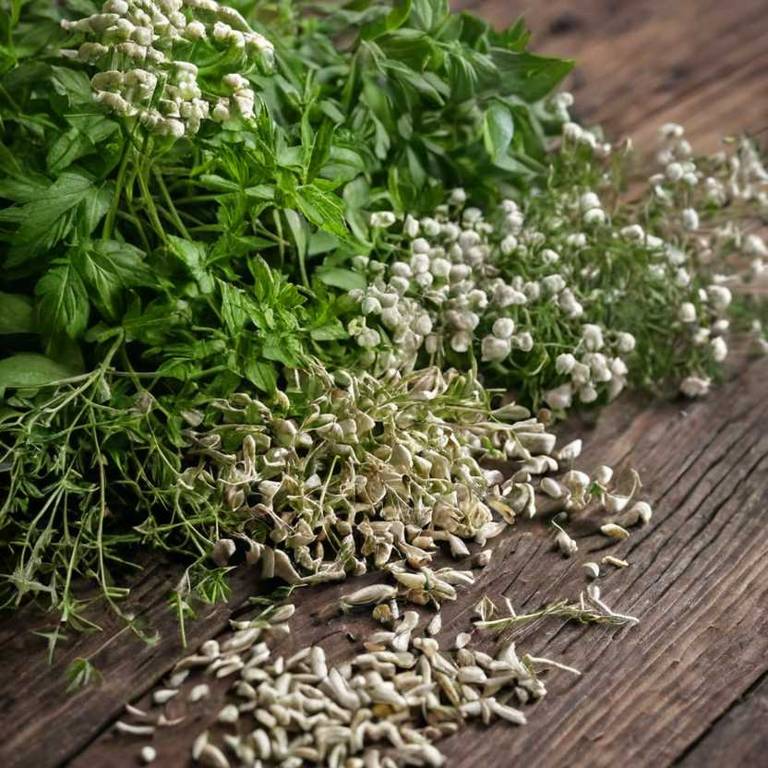Reynoutria multiflora

Reynoutria multiflora, commonly known as Chinese knotweed, is a perennial plant native to East Asia, characterized by its invasive and fast-growing properties.
The plant is valued for its medicinal properties, providing various health benefits such as reducing inflammation, improving cardiovascular health, and aiding in the treatment of diabetes and certain types of cancer.
The therapeutic actions of Reynoutria multiflora include antioxidant, anti-inflammatory, and anti-diabetic activities, which are attributed to its bioactive constituents including resveratrol, salicylic acid, and flavonoids.
The plant's bioactive constituents also exhibit antimicrobial and anti-cancer properties, making it a promising natural remedy for various health conditions.
Related Study
According to "Pharmaceutical biology", reynoutria multiflora benefits wound healing by decreasing the total bacterial count, wound area, and inflammatory factors, while increasing the expression of growth factors and promoting angiogenesis, fibroblasts, and collagen deposition.
This page analize the most important medicinal aspects of Reynoutria multiflora.
Table of Contents
Health Benefits of Reynoutria multiflora
Reynoutria multiflora has many benefits, such as its potential to reduce inflammation and alleviate symptoms of conditions like arthritis, gout, and eczema.
It may also help lower blood pressure, improve cardiovascular health, and even aid in the management of diabetes by regulating blood sugar levels.
Additionally, its antioxidant properties can help protect against cell damage, promote wound healing, and even support bone health, reducing the risk of fractures and osteoporosis.
By incorporating Reynoutria multiflora into one's lifestyle, individuals may experience improved overall health, increased energy levels, and a reduced risk of chronic diseases, ultimately leading to a longer and healthier life.
Therapeutic Actions of Reynoutria multiflora
Reynoutria multiflora has many therapeutic actions, such as its anti-inflammatory properties, which can help alleviate pain and swelling in individuals suffering from arthritis, thereby improving their daily mobility and quality of life.
Additionally, its antioxidant and antimicrobial properties can aid in wound healing, reducing the risk of infection and promoting faster recovery.
Reynoutria multiflora's neuroprotective effects have also been shown to improve cognitive function and memory in individuals with neurodegenerative diseases, such as Alzheimer's and Parkinson's, allowing them to maintain their independence and engage in daily activities with greater ease.
Furthermore, its adaptogenic properties can help reduce stress and anxiety, enabling individuals to better cope with the demands of everyday life and improve their overall mental well-being.
Bioactive Constituents of Reynoutria multiflora
Reynoutria multiflora has many active constituents, such as ferulic acid, scopoletin, and caffeic acid, which possess antioxidant and anti-inflammatory properties.
These compounds help to improve cardiovascular health by reducing triglyceride levels and lowering blood pressure, thereby decreasing the risk of heart disease.
The plant also contains sesquiterpenes, such as falcarinol and falcarinol acetate, which have been shown to have anti-cancer properties and may help to reduce the risk of certain types of cancer.
Additionally, the medicinal constituents of Reynoutria multiflora, including flavonoids and phenolic acids, have been found to have anti-aging effects, improving skin health and reducing the visible signs of aging.
Medicinal Parts of Reynoutria multiflora
Reynoutria multiflora has many medicinal parts, such as the roots, leaves, and stems.
The roots of Reynoutria multiflora are rich in glycosides like aucubin and hesperidin, which are used for their anti-inflammatory and antioxidant properties.
The leaves and stems of the plant contain flavonoids like quercetin and kaempferol, as well as phenolic acids like ferulic acid, which are known for their antioxidant and anti-inflammatory effects.
Herbal Preparations of Reynoutria multiflora
Reynoutria multiflora has many herbal preparations, such as teas, tinctures, and infusions, which are utilized for their medicinal properties.
The tea, made by steeping the plant's roots in hot water, is commonly used to reduce inflammation and alleviate symptoms of arthritis.
The tincture, a concentrated extract of the plant's roots, is often used as a treatment for fever and skin conditions, such as eczema and acne.
Additionally, infusions of Reynoutria multiflora are used to support cardiovascular health and lower blood pressure.
Possible Side Effects of Reynoutria multiflora
Reynoutria multiflora can have side effects if used improperly, such as causing thyroid problems, which may lead to fatigue, weight gain, and sensitivity to cold temperatures.
Prolonged use of the plant can also cause blood thinning, resulting in increased risk of bleeding and bruising.
Furthermore, Reynoutria multiflora may interact with certain medications, such as blood thinners and diabetes medications, leading to adverse reactions.
In severe cases, improper use of the plant can cause more serious health issues, including agranulocytosis, a potentially life-threatening decrease in white blood cells.